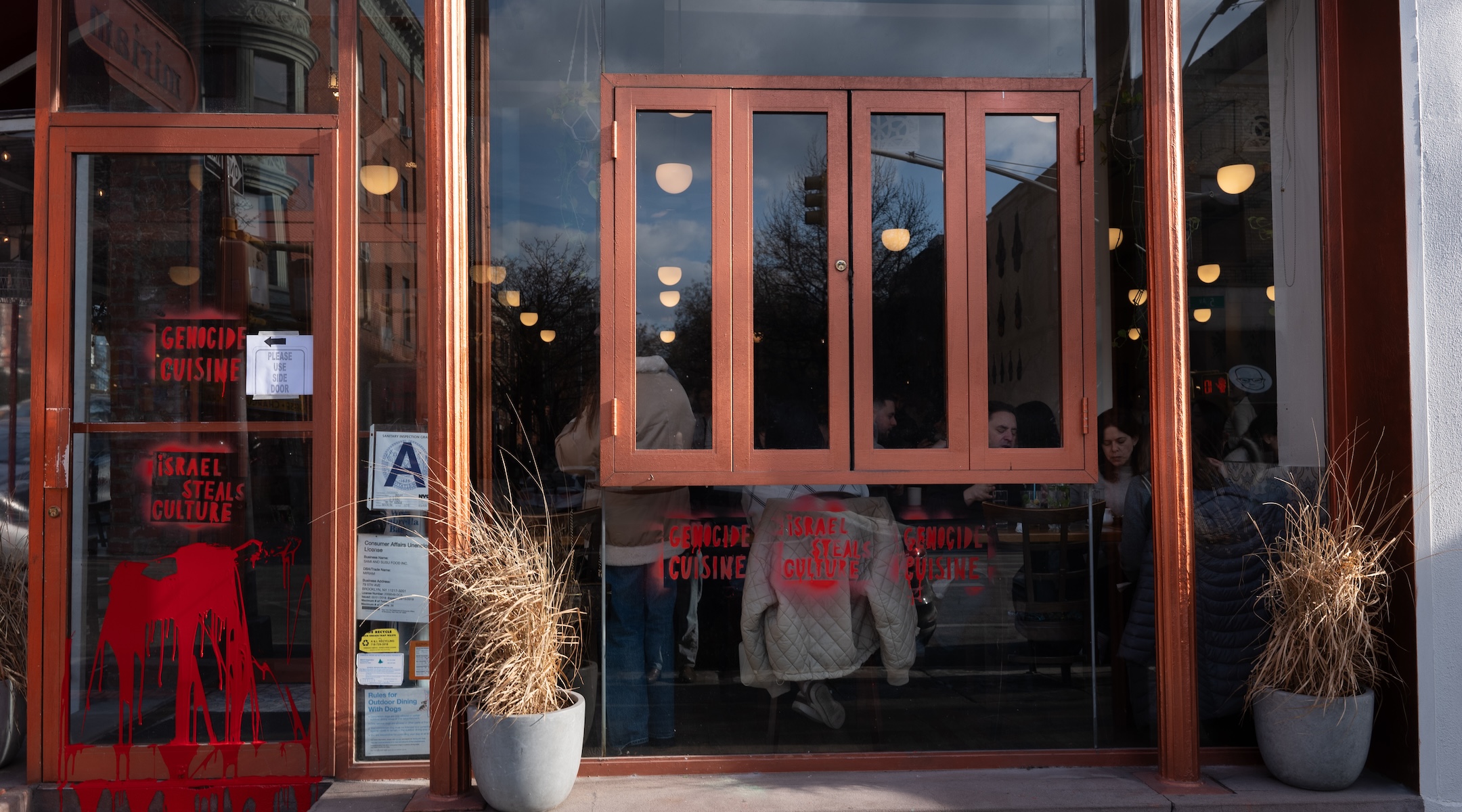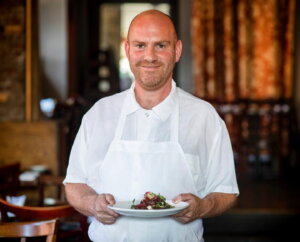Antisemitic vandals hit my Israeli Brooklyn restaurant, Miriam. But I won’t be intimidated
Vandalism won’t stop us from serving great food — and, with it, joy, connection and unity

Customers showed up to support Miriam, the popular Israeli-owned restaurant after it was vandalized by graffiti, Park Slope, Brooklyn, Jan. 26, 2025. Photo by Joseph Strauss
As the owner and chef of the beloved Brooklyn Israeli restaurant Miriam, this weekend’s vandalism by individuals who hand-painted graffiti reading “GENOCIDE CUISINE” and “ISRAEL STEALS CULTURE” in red paint on our exterior felt like more than just a targeted act of hate — it was a painful reminder of the challenges we face as a society.

When I founded Miriam in 2005, my vision was always about more than just food. As a chef, I see hospitality as an art form — a way to showcase people’s spirits in a warm atmosphere. At Miriam, the spices I use tell stories of heritage; the dishes celebrate diversity; and the atmosphere brings it all together to create something greater than the sum of its parts. This is the essence of hospitality — not just serving food, but creating a space where people feel seen, welcomed and cared for.
Dining is about the magic of shared moments, and Miriam is a place where I hoped people from all walks of life could come together around a table to share stories, savor the vibrant flavors of Mediterranean cuisine, and feel at home.
“Home,” for me, means embodying the story of Israeli food. I was born and raised in Petah Tikvah, where I learned that Israel, as a young nation, has been shaped by a medley of cultures, cuisines, and traditions from more than 100 countries across the Mediterranean, Middle East, Europe and beyond. Our food at Miriam is made with the deepest respect for the diverse history, and cultures, that inform the cuisine with which I was raised.
It’s always devastating to see hate find its way into spaces dedicated to joy and connection. Yet, while this act of vandalism hurt me deeply, it also reaffirmed the mission I’ve worked so hard to enact.
I knew I had a choice to make. I could let this act define the narrative of Miriam, or I could use it as an opportunity to amplify the values of neighborliness, warmth and inclusion that we represent.
For me, the decision was clear.
Instead of focusing on the negativity, I choose to focus on the outpouring of support we receive from the community. Local residents, regular customers, and even strangers who had never before set foot in the restaurant are reaching out with words of encouragement. The overwhelming response reminds me why I started this journey in the first place. It reaffirms my belief that the majority of people — regardless of their background — desire unity.
This incident, painful as it was, has only strengthened my commitment to giving that same love back. I want everyone who steps through our doors to feel that they are part of something bigger — a community built on respect and understanding. Hate has no place here.
Actions taken in anger often seek to divide. But they also present an opportunity to find new strength, if we practice resilience. By standing firm in our values, we send a powerful message — not just to those who target us, but to everyone watching. We show that acts of hate cannot break us; they can only make us more determined to spread love and connection.
The graffiti is gone, but the story of this event remains. I see it as a reminder to deepen my commitment to creating an inclusive and welcoming environment for everyone who comes to Miriam. It has also underscored the need to actively engage in meaningful conversations, provide educational opportunities, and raise awareness about the specific challenges of antisemitism and hate that impact our staff and community. I want Miriam to stand as a symbol of what’s possible when we choose connection over division.
At the heart of it all, I’m just a chef — someone who believes in the power of food to bring people together. But this experience has reminded me how essential it is that restaurants like mine serve as places where values of love, unity and resilience are not only celebrated but lived every single day. And that’s a legacy I’m proud to uphold.
















